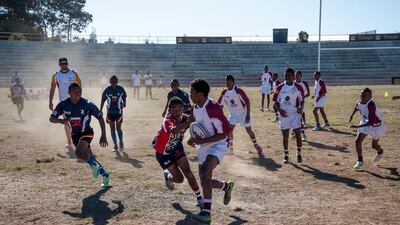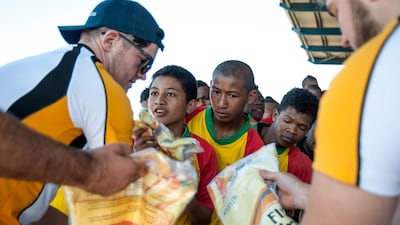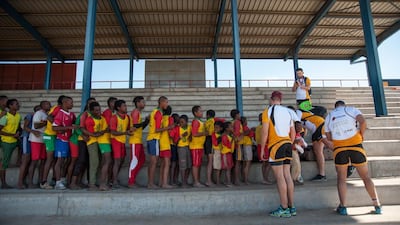As he surveyed the scene, Mike Ballard was moved to laugh.
Scores of Madagascan children charging around a national rugby stadium, in a bustling capital of around three million people, all wearing the colours of Arabian Gulf rugby clubs.
“Just how did we get here?” Ballard pondered, as he got ready to blow his recently acquired vuvuzela to signal half-time.
The prosaic answer would be via Air Seychelles flight HM187 from Abu Dhabi.
The philosophical one, though, demands greater inspection.
How did a group of teachers, lawyers, personal trainers, and men from other varied backgrounds end up island hopping in the Indian Ocean, dealing out wheelchairs, rugby expertise and goodwill? How did Doha end up going undefeated to win a 10-a-side tournament for Under 15s in the “City of a Thousand Warriors”?
And how did he get here? Ballard broke his back playing rugby a little over two years ago. A foundation was set up in his name, initially to cover his medical costs. Now, at his wish, that has been redirected to other causes.
** Watch: Conquistadors prepare for Madagascar goodwill mission **
The first beneficiaries have been the rugby community of Madagascar. Which, it turns out, is a frenzied, passionate community of thousands.
And on the evidence of a five-team youth tournament played at the national team’s home ground, the Air Seychelles Mike Ballard Foundation Conquistadors are the most welcome guests.
Randrianorosoa Antsoniandro, the technical director of the Madagascan Rugby Federation, said the simple act of giving out playing kit was more than any of the players are used to.
“This was a great opportunity for these children because they got the chance to play in a stadium,” Antsoniandro said.
“If not, it would have been on the streets. When they are in the streets playing, they play between themselves, with no coach, no instruction. They freestyle. This initiative is important at this level, to give technical and tactical assistance.
“Here they have the chance to play with shirts, and that gives them the chance to express themselves better.
“And, of course, it is easier to play with shoes than without.”
When the Conquistadors team bus pulled up outside the stadium, the players did not know what to expect.
Having trained there the previous afternoon, they knew the pitch itself was somewhat more tatty than those they are used to at Zayed Sports City in Abu Dhabi, or The Sevens in Dubai.
But the rest? There was barely any welcome committee. They were able to unpack their luggage from the bus roof-rack totally untroubled.
It seemed like barely a soul was there, in a city where space is generally at an absolute premium. Maybe they had been forgotten about.
Then they walked through the small tunnel to enter the stadium, and inside five sets of players had formed neat lines near the halfway line.
More on the Madagascar tour
• 'Business as usual': Mike Ballard and a story of rugby, paralysis and inspiring UAE return
• Goodwill tour to go ahead: Arabian Gulf players determined to see it through despite security concerns
Each of the Madagascan players was beaming, eager to get play started, cheering the arrival of the Conquistadors. And ready to get their hands on some precious stash.
For some, the only item of clothing they had was a pair of shorts. Barely any had shoes. World Bank poverty assessments suggest as many as 60 per cent of people in Madagascar are “extremely poor”. Football boots, unsurprisingly, are low down the list of any family’s priorities.
According to Frederic Dumant, a French former scrum-half who acts as a consultant to the Madagascan federation to try to get more teams to tour Madagascar, few are able to wear shoes.
“This is like an instant photograph of what is happening everywhere in the country,” Dumant said.
“The majority of athletes have nothing. The majority of people have no shoes. The top clubs buy shoes. Before the game, they give the players a pair of shoes, then after the game they take them back.
“You can see the ability of the players without shoes. On this pitch, players from abroad would say they could not play, it would hurt their feet.
“Every day, a lot of these kids have to struggle just to survive, so it is not a problem for them to play rugby without anything. They think there are other things more vital than their feet.”
It should lend some perspective. The touring players come from clubs in the Gulf that are all well versed in arranging sponsorship deals.
Some clubs in Dubai, for instance, have partnerships with the leading sports car makers in the world. Others have barter agreements with airlines for subsidised air travel when they travel overseas for Friday matches.
Madagascan clubs have similar arrangements, but for more basic means.
“Each club has partners,” Dumant says. “For example, one partner might give them 100 eggs. Another might give them 10 litres of milk.
“As a result, every club can feed their players, so playing rugby is a way to eat for more people. The opportunity for them to get into rugby is always an opportunity to eat.
“This trip will reinforce the impact of rugby. For us, it seems like nothing to have shoes. For them it is everything.”
Dumant says rugby is a way to beat poverty. “Rugby brings something different,” he said.
“It gives a way to escape poverty, to have things you cannot afford to.
“Rugby players here all work in local administrations, so they have money to live. Rugby is equivalent to social progression for them.”
The Conquistadors brought 1.2 tonnes of cargo with them from the UAE. Much of their load was medical equipment, bound for hospitals in Seychelles, where the team transited, and Antananarivo.
When they touched down in Madagascar, a minibus had been hired just for the luggage. It was all filed away like setting up a giant game of Kerplunk.
At the end of the 40 minute drive from the airport to the team hotel, a chain of players was assembled to move the bags from the bus to the lobby.
Their exertions were accompanied by the beat of a drum that a street hawker had initially planned to set about flogging to new prey.
Once he realised they had their mind on the task at hand, rather than haggling over local handicrafts, he set about providing a musical accompaniment instead.
All the effort was worth it. At the ground, as the players divvied out the shirts, shorts and socks of five Gulf rugby clubs to the young players of Antananarivo, the reaction was priceless.
The queues might have been orderly, but each child was hankering to get to the front. One, with an elaborate checkerboard motif cut into his hair, but no shoes on his feet, hugged his new Jebel Ali Dragons jersey, and his boots from GoSports, before high-fiving each of his teammates.
“We are used to seeing kids playing football and cricket on the streets, but in Madagascar it is rugby, rugby, rugby, everywhere,” said Brendan Rawlings, a Dubai-based personal trainer.
“When we were giving out the kit, they were beyond being like kids at Christmas. You could see disbelief on their faces that they were being given this stuff. Most of them arrived covered in mud, with no shoes. Now they have these brand new shirts on.
“They are running around hugging each other. For the cost of those boots, some kids in Dubai might be given those three or four times a season.
“For these kids, it is once in a lifetime they will be given something like that. I’d imagine they will be wearing them down the high street, too.”
For the record, Doha won – or rather, local club USA Ankadifotsy kitted out by Doha – were the champions on the day. They won four matches out of four, and showed off some skills that would not be out of place on Pitch 1 at the annual Dubai Rugby Sevens in the process.
For Winston Cowie, the tour manager, the day had encapsulated precisely what the Conquistadors had been set up to do.
They had harnessed the community spirit of rugby in the Arabian Gulf for the good of others.
“When we left the airport and were driving through Antananarivo, all of a sudden, the bus went quiet,” Cowie said.
“Everybody was sobered by what they saw. There were thousands of people. Everyone was doing something, going somewhere, but they didn’t appear to have much.
“To get here, to put all the worries of logistics behind us, and to see the smiles on the kids’ faces has just been incredible, the most special and rewarding day I have ever had in over 30 years in rugby.
“You plan these things and you never know how they are going to turn out. It is a testament to all the clubs in the Gulf and what they have put into it.”
pradley@thenational.ae
Follow us on Twitter @NatSportUAE
Like us on Facebook at facebook.com/TheNationalSport






